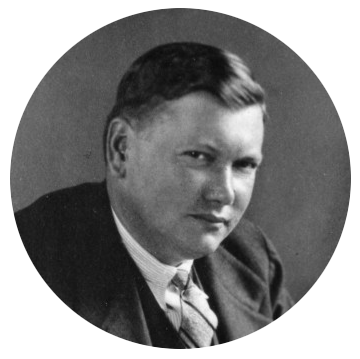
Ralph Peer was the foremost champion of roots music in the early days of the American recording industry. In his vision, there were untapped markets beyond the record companies’ targeted audience for classical music and the mainstream popular repertoires of standards, vaudeville, Broadway, and Tin Pan Alley. He recorded music from the plantations, farms, mountains, swamps, backwoods, and city streets, and generated a treasure trove of recordings of blues, country, and other genres from the many American folk traditions.
Peer has been most widely saluted for his role in country music, when it was known as hillbilly, being the first to record Jimmie Rodgers, the Carter Family, Fiddlin’ John Carson, and many more. He was inducted into the Country Music Hall of Fame in 1984. But he was recording blues prior to (and during) his ventures into country, and in fact had a hand in the Mamie Smith “Crazy Blues” session of 1920 that is acknowledged as the catalyst for record companies to launch “race music” catalogs of African-American blues, jazz, and gospel music. He is even one of the men credited with introducing the term “race music” —later criticized, but originally symbolizing pride in the black race, according to Peer, who said he took his cue from African-American newspapers that took pride in accomplishments of “the race.”
With OKeh Records or later with Victor, Peer recorded the Memphis Jug Band, Tommy Johnson, Frank Stokes, Blind Willie McTell, Bukka White, Sleepy John Estes, Jim Jackson, Gus Cannon, Memphis Minnie, Alberta Hunter, Sippie Wallace, Victoria Spivey, Sara Martin, blues guitar pioneer Sylvester Weaver and many others, including jazz, gospel, Cajun, and Latin artists. A businessman, not a folklorist, Peer was intent on producing records that would sell, by publishing the songs for profit through his Southern Music firm and, later, Peer International. But in the process of doing so, he created a historical, artistic, and cultural legacy of incalculable importance.
Peer was instrumental in formulating the various series of blues, hillbilly, and other genres, but he knew the greater monetary potential for pop music, and as time passed he focused more on publishing songs by the likes of Johnny Mercer and Hoagy Carmichael, even getting into the rock ‘n’ roll market in the 1950s. His interests also included horticulture, a passion he shared with another Blues Hall of Fame record maker, H.C. Speir. Peer, who was born on May 22, 1892 in Kansas City, Missouri (not Independence as has also been reported), died in Hollywood on January 19, 1960. His career is illuminated in Barry Mazor’s book Ralph Peer and the Making of Popular Roots Music.
